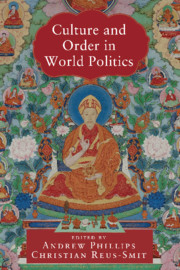Book contents
- Culture and Order in World Politics
- LSE International Studies
- Culture and Order in World Politics
- Copyright page
- Contents
- Additional material
- Contributors
- Preface
- Part I Introduction
- Part II Historical Orders
- Part III The Modern ‘Liberal’ Order
- 6 Cultural Diversity within Global International Society
- 7 Liberal Internationalism and Cultural Diversity
- 8 When Liberal States Bite Back
- 9 Global Institutional Imaginaries
- Part IV Constitution and Contestation
- Part V Conclusion
- References
- Index
9 - Global Institutional Imaginaries
from Part III - The Modern ‘Liberal’ Order
Published online by Cambridge University Press: 25 December 2019
- Culture and Order in World Politics
- LSE International Studies
- Culture and Order in World Politics
- Copyright page
- Contents
- Additional material
- Contributors
- Preface
- Part I Introduction
- Part II Historical Orders
- Part III The Modern ‘Liberal’ Order
- 6 Cultural Diversity within Global International Society
- 7 Liberal Internationalism and Cultural Diversity
- 8 When Liberal States Bite Back
- 9 Global Institutional Imaginaries
- Part IV Constitution and Contestation
- Part V Conclusion
- References
- Index
Summary
The liberal international order of states has engendered a global order of transnational and supranational agents, institutions, and practices, generating a nascent global polity. This polity is animated by social purposes, including peace and security, economic growth, global health, and the rights and well-being of individuals. It also champions a distinctive diversity regime, centred on the moral primacy of the individual. Focusing on six components of the emerging global polity, the chapter describes both the institutional lineaments and the cultural core of the global polity-in-formation, including its distinctive diversity regime. Ethnic, religious, and other forms of cultural difference are legitimated, but only so long as they do not compromise the fundamental equality and autonomy of the persons who stand as global citizens. The global polity is also in fundamental tension with the liberal order, ultimately challenging basic principles of the nation state: sovereignty, citizenship rights, and national boundaries.
Keywords
- Type
- Chapter
- Information
- Culture and Order in World Politics , pp. 182 - 204Publisher: Cambridge University PressPrint publication year: 2020
- 1
- Cited by

